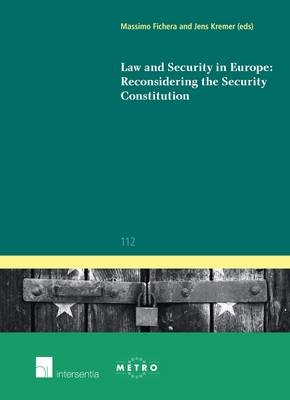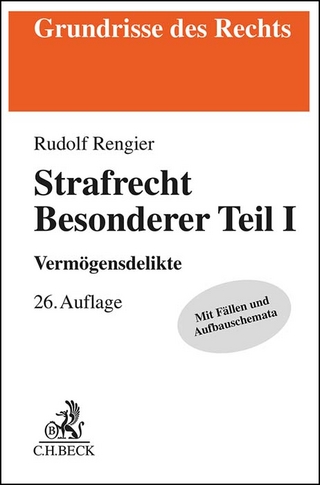
Law and Security in Europe: Reconsidering the Security Constitution
Intersentia Ltd (Verlag)
978-1-78068-147-4 (ISBN)
- Titel ist leider vergriffen;
keine Neuauflage - Artikel merken
This collection of essays is divided in two parts. In the first part, security is considered from a theoretical angle, as a phenomenon that has become an integral part of modern society and inevitably interacts with law in many ways. The aim of the authors' analyses is to emphasise the ambiguity of the notion of security and its tendency to expand and affect simultaneously different fields of law. Depending on the adopted approach, security can be understood in many different terms and through various concepts: inter alia through exceptionality, from a constructivist viewpoint, or as human security. Whereas for example, an 'existential' approach takes risk and danger as a fact of life and is based on the assumption of the fragility of the human condition, leading to traditional and military understandings of security, a constructivist approach regards security as a discursive speech act enabling criticism of security claims. Analysing security in connection with law highlights both tensions and contradictions.
From classical analyses on states of emergency to new conceptualizations of security as a specific dimension within the process of European integration ('the European Security Constitution'), legal approaches to security and law today are facing many paradoxes and challenges. The second part of the book considers some of these security dilemmas in two specific areas of law: human rights and criminal law. Here, the authors address the militarisation of the fight against terrorism, the distinction between administrative and penal sanctions, the limits of intelligence activities and the scope of criminalisation. As the book brings together scholars from different fields of law focusing on law and security from particular perspectives it is appealing to those constitutional, criminal, international and EU lawyers who are interested in both theoretical and practical aspects of the relationship between security and law.
Massimo Fichera Massimo Fichera (PhD, University of Edinburgh) is a Post-Doctoral Fellow at the Finnish Academy Centre of Excellence in Foundations of European Law and Polity Research. His research interests lie in the intersection between EU and international law and the conceptualisation of the notions of community and security. His monograph Th e Implementation of the European Arrest Warrant in the European Union: Law, Policy and Practice (Intersentia, 2011) deals with the principle of mutual recognition in criminal matters. Alun Gibbs Senior Lecturer in Public Law at the University of Southampton. Formerly, a researcher at the European University Institute in Florence where he worked on constitutional issues surrounding the EU's Area of Freedom, Security and Justice. Jens Kremer Jens Kremer is a Doctoral Researcher at the Faculty of Law in Helsinki and the Centre of Excellence in Foundations of European Law and Polity Research. He holds a Masters Degree in Political Sciences, Law and Sociology from the University of Wurzburg and a LL.M. in Public International Law from the University of Helsinki. His main areas of interest are on public international law, international human rights law and security as well as legal and political theory. His current research focuses on modern surveillance technology and human rights. Sakari Melander LL.D., docent (criminal law) Sakari Melander is cu rrently working as a Post-Doctoral Researcher at the University of Helsinki. His research interests include European criminal law, especially EU criminal law, criminal law theory, criminalisation and punishment theories and foundations of criminal justice policy. He is a member of the Centre of Excellence in Foundations of European Law and Polity based at the University of Helsinki. Kimmo Nuotio Kimmo Nuotio is Professor of Criminal Law at the University of Helsinki. He is currently the Dean of the Faculty of Law. He is also the Vice-Director of the Centre of Excellence in Foundations of European Law and Polity Research, funded by the Academy of Finland. Nuotio has researched on theoretical issues concerning criminal liability, most recently in the context of European law. Tuomas Ojanen Tuomas Ojanen is Professor of Constitutional Law at the University of Helsinki. He is also part-time professor within the SURVEILLE project at the European University Institute and a researcher at the Academy of Finland Centre of Excellence in the Foundations of European Law and Polity. His main areas of research and expertise include Finnish constitutional law, international human rights law and constitutional law of the EU. Jarna Petman Dr Jarna Petman (LL.D.) is Deputy Director of the Erik Castren Institute of International Law and Human Rights, of which she is one of the three founders, and Senior Lecturer (professor ad interim) of International Law at the University of Helsinki. Dr Petman is also a Member of the European Committee of Social Rights as well as a research fellow at the Academy of Finland Centre of Excellence in the Foundations of European Law and Polity. She has worked as a legal consultant and has trained judges and prosecutors in Finland and abroad. She acts as a legal expert before the Constitutional Law Committee of the Parliament of Finland and is an expert member of the Human Rights Advisory Board of the Ministry for Foreign Aff airs. She frequently appears in the media as a commentator on current aff airs. Kaarlo Tuori Kaarlo Tuori is Professor of Legal Th eory at the University of Helsinki. He is a legal and constitutional theorist, combining legal scholarship with social science and philosophy. He currently holds the position of distinguished Academy Professor (2011) and is Vice- President of the Council of Europe's Venice Commission (European Commission for Democracy through Law). His main publications include Critical Legal Positivism (Ashgate, 2002) and Ratio and Voluntas
About the Authors List of Abbreviations Introduction Jens Kremer, Massimo Fichera PART I Chapter 1. Exception, Protection and Securitization: Security Mindsets in Law Jens Kremer 1. Introduction 2. Security as security mindsets 3. Security mindsets and law: protection and exception 4. Identifying security mindsets - the traditional security mindset 5. The expanded security mindset 6. The constructive security mindset: the Copenhagen School and law 7. Securitization 8. De-securitization 9. Securitization, the exception and law 10. Security mindsets and legal exceptions 11. Exceptions within the law: limitations and derogations 12. Exceptions 'above' the law: amendments 13. Conclusion Bibliography Chapter 2. A European Security Constitution? Kaarlo Tuori 1. Constitution and security 2. Dimensions and levels of constitution 3. Constitution and constitutionalisation Contents 4. Constitutional claims and promises 5. From Trevi to Maastricht 6. The significance of Amsterdam 7. Lisbon and after 8. The concept of security: from emergency to security 9. Individual and social aspects of security 10. Security in the context of the Area of Freedom, Security and Justice 11. The insecure security constitution Bibliography Chapter 3. Security Issues as an Existential Threat to the Community Massimo Fichera 1. Introduction 2. The concept of security 3. Margin of appreciation and security 3.1. The debate in international law (in particular, the ECHR) 3.2. The debate in the European courts 4. Conclusion Bibliography Chapter 4. Public Foundation as the Striving for Security Alun Gibbs 1. Globalised security 2. Security and the state 3. Returning to the problem of global security 4. Political life beyond security 5. Conclusion Bibliography PART II Chapter 5. Security and Rights in the War on Terror: On the Constitutive Insecurity of Rules Jarna Petman 1. Ruling out the enemy: defining terrorism 1.1. The unbridgeable gap 1.2. Those that will not be eliminated 2. A war without rules? 2.1. 'War on Terror' as a non-international armed confl ict 2.2. 'War on Terror' as an international armed confl ict 2.3. 'War on Terror' as an internal armed confl ict 3. Striking a balance: rights or security? 3.1. Rights over security 3.2. Security over rights 3.3. Security as rights 4. Reaching for certainties: the inalienable right not to be tortured? 5. On the constitutive insecurity of rules Bibliography Chapter 6. Administrative Measures in Counter-Terrorism Activities - More Leeway for the Imperatives of Security at the Expense of Human Rights? Tuomas Ojanen 1 Introduction 2. Manifestations and rationales 3. Constitutional implications of the administrative approach 4. Reliance on intelligence as the basis for administrative counter-terrorism measures 4.1. General observations 4.2. Excursion: use of opinions by the Finnish Security Intelligence Service in Finnish immigration law proceedings 5. Concluding observations Bibliography Chapter 7. Security and Criminal Law: A Diffi cult Relationship Kimmo Nuotio 1. Introduction 2. Security and safety 3. Risk/danger 4. The history of thought: Ewald and Foucault 5. 'Policey' as a governance of security 6. The European Union as an Area of Freedom, Security and Justice Bibliography Chapter 8. The Blurred Architecture of European Criminal Law Sakari Melander 1. Introduction 2. The subsidiarity of European criminal law 3. European criminal law in a European and international setting 4. The Area of Freedom, Security and Justice 5. Conclusion Bibliography Conclusions
| Erscheint lt. Verlag | 27.3.2013 |
|---|---|
| Verlagsort | Cambridge |
| Sprache | englisch |
| Maße | 172 x 236 mm |
| Gewicht | 474 g |
| Themenwelt | Recht / Steuern ► EU / Internationales Recht |
| Recht / Steuern ► Strafrecht ► Besonderes Strafrecht | |
| Recht / Steuern ► Strafrecht ► Strafverfahrensrecht | |
| ISBN-10 | 1-78068-147-X / 178068147X |
| ISBN-13 | 978-1-78068-147-4 / 9781780681474 |
| Zustand | Neuware |
| Haben Sie eine Frage zum Produkt? |
aus dem Bereich


